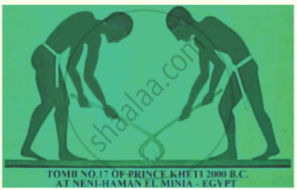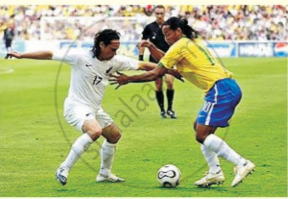Advertisements
Advertisements
Question
Thinking about the Poem
Write the story of ‘A Legend of the Northland’ in about ten sentences.
Solution
Once Saint Peter stopped by an old lady’s cottage because he was feeling hungry and weak after the day’s fasting. The lady was baking cakes on the hearth. Since he was weak with fasting, he asked her for a cake from her store of cakes. The selfish lady tried to bake small cakes but each time they seemed too big for her to give away. Finally, she baked one that was as thin as a wafer. Unable to part with it too, she put it on a shelf and did not give any cake to the Saint. Saint Peter was very angry with her behaviour and said she was too selfish to live as a human and have food, shelter and a fire to keep her warm. He punished her by changing her into a woodpecker that would have to build a nest to live in, bore for food in the trunks of trees. Her clothes were burned and she was left with her scarlet cap on her head as she flew out through the chimney. Even today she still lives in the woods and is seen by all the country school boys.
APPEARS IN
RELATED QUESTIONS
Thinking about the Text
Answer these question.
They can’t hang me twice.”
(i) Who says this?
(ii) Why does the speaker say it?
What actions of the schoolmates change the author’s understanding of life and people, and comfort him emotionally? How does his loneliness vanish and how does he start participating in life?
Read and enjoy :
Hockey 
Do you know when hockey was first played? Research in Ethiopia has discovered that it has been around for more than four millenia. A tablet in Greece has images of young people playing field hockey. Even in South America, Ireland, Egypt, Scotland and Rome, there are proofs and records of this game. The game in these countries was no different than the other even though it was known by different names. Hundreds of years ago, this game was known as 'Hockie' in Ireland and it is this name that has stuck with the game ever since.

While current field hockey appeared in the mid-18th century in England, primarily in schools, it was not until the first half of the 19th century that it became firmly established. Prior to 1980, women were not permitted to take part in this game. The first club was created in 1849 at Blackheath in south-east London. During the 1600s and 1700s, hockey in England was a little dissimilar and it was more disorganised. People from all over the village would take part in the game. It was not unusual for a team to have 60 - 100 players. It was the goal of the team players to get the ball into the common ground of the rival team. This game required quite a few days to finish. Many players suffered injuries. Even though umpires were present, they were not allowed to say anything without the team members' request.
Ultimaty , good judgment prevailed. Firm regulations were introduced. In England, a headmaster restricted the number of players to thirty for one single team, During the 1860s, England's Eton College laid down some rules for the game. Additional rules were introduced afterthe formation of the Hockey Association in the year 1875.
Football
Football refers to a number of similar team sports, all of which involve (to varying degrees) kicking a ball with the foot in an attempt to score a goal. People from around the world have played games which involved kicking and / or canying a ball, since ancient times. However, most of the modern codes of football have their origins in England.

The most popular of these sports worldwide is association football, more comm.only known as just 'Football' or 'Soccer'. It is widely considered to be the most popular sport in the world
Easton, with a little laugh, as if amused, was about to speak again when the other forestalled him. The glum-faced man had been watching the girl’s countenance with veiled glances from his keen, shrewd eyes.
“You’ll excuse me for speaking, miss, but, I see you’re acquainted with the marshall here. If you’ll ask him to speak a word for me when we get to the pen he’ll do it, and it’ll make things easier for me there. He’s taking me to Leavenworth prison. It’s seven years for counterfeiting.”
“Oh!” said the girl, with a deep breath and returning color. “So that is what you are doing out here? A marshal!”
“My dear Miss Fairchild,” said Easton, calmly, “I had to do something. Money has a way of taking wings unto itself, and you know it takes money to keep step with our crowd in Washington. I saw this opening in the West, and—well, a marshalship isn’t quite as high a position as that of ambassador, but—”
Read the extract given below and answer the question that follow.
What was the crime of the prisoner? And what is the punishment.
“You haven’t brought home that sick brat!” Anger and astonishment were in the tones of Mrs. Joe Thompson; her face was in a flame.
“I think women’s hearts are sometimes very hard,” said Joe. Usually Joe Thompson got out of his wife’s way, or kept rigidly silent and non-combative when she fired up on any subject; it was with some surprise, therefore, that she now encountered a firmly-set countenance and a resolute pair of eyes.
“Women’s hearts are not half so hard as men’s!”
Joe saw, by a quick intuition, that his resolute bearing h«d impressed his wife and he answered quickly, and with real indignation, “Be that as it may, every woman at the funeral turned her eyes steadily from the sick child’s face, and when the cart went off with her dead mother, hurried away, and left her alone in that old hut, with the sun not an hour in the sky.”
“Where were John and Kate?” asked Mrs. Thompson.
“Farmer Jones tossed John into his wagon, and drove off. Katie went home with Mrs. Ellis; but nobody wanted the poor sick one. ‘Send her to the poorhouse,’ was the cry.”
“Why didn’t you let her go, then. What did you bring her here for?”
“She can’t walk to the poorhouse,” said Joe; “somebody’s arms must carry her, and mine are strong enough for that task.”
Read the extract given below and answer the question that follow.
What kind of person does Mrs Thompson appear to be?
“Do the scientists really know? Will it happen today, will it ?”
“Look, look; see for yourself !”The children pressed to each other like so many roses, so many weeds, intermixed, peering out for a look at the hidden sun. It rained. It had been raining for seven years; thousands upon thousands of days compounded and filled from one end to the other with rain, with the drum and gush of water, with the sweet crystal fall of showers and the concussion of storms so heavy they were tidal waves come over the islands. A thousand forests had been crushed under the rain and grown up a thousand times to be crushed again. And this was the way life was forever on the planet Venus, and this was the schoolroom of the children of the rocket men and women who had come to a raining world to set up civilization and live out their lives.
Read the extract given below and answer the question that follow.
Describe the rain and its effect on life on Venus.
Answer the following question.
Kari was like a baby. What are the main points of comparison?
Answer the following question.
Kari helped himself to all the bananas in the house without anyone noticing it. How did he do it?
Answer the following question.
Why is it good to have rebels?
What do you know about the Viking Mission to Mars?
Which word in the extract means, ‘holes’?
The story ‘Taro’s Reward’ shows that Taro is thoughtful, hardworking and also wise. Read aloud the parts of story that show these qualities in Taro.
Replace the italicised portion of the sentence below with a suitable phrase from the box. Make necessary changes, wherever required.
I will examine the matter carefully before commenting on it.
Find out the different kinds of work done by the people in your neighbourhood. Make different cards for different kinds of work. You can make the card colourful with pictures of the persons doing the work.
What is the condition of the window described in the poem?
Encircle the correct article.
(A/An/The) one beside (a/an/the) banana
Speak to five adults in your neighbourhood. Ask them the following questions (in any language they are comfortable in). Then come back and share your findings with the class.
- Do they buy their provisions packed in plastic packets at a big store or loose, from a smaller store near their house?
- Where do they buy their footwear? Do they buy branded footwear or footwear made locally? What reasons do they have for their preference?
- Do they buy readymade clothes or buy cloth and get their clothes stitched by a tailor? Which do they think is better?
Read the extract given below and answer the questions that follow:
| Exceeding peace had made Ben Adhem bold, And to the presence in the room he said, "What writest thou?" |
- To whom did Ben Adhem address these words? Mention the context in which he said this. [2]
- What was the ‘presence’ doing in Ben Adhem’s room? What did the presence say in response to Ben Adhem’s question? [2]
- What did Abou ben Adhem say after this exchange? How did the presence respond to his words? [3]
- Describe the events of the following night. [3]
Read the following extract from Stephen Leacock’s short story, ‘With the Photographer’ and answer the questions that follow:
|
“The photographer beckoned me in. I thought he seemed quieter and graver than before. I think, too, there was a certain pride in his manner. He unfolded the proof of a large photograph, and we both looked at it in silence. ‘Is it me?’ I asked. “Yes,” he said quietly, ‘it is you,” and we went on looking at it.” |
- Where was the narrator?
Why had he gone there?
Why do you think that there was a certain pride in the photographer's manner? [3] - What does the word "proof” mean in this context?
Why did the narrator ask, “Is it me?”? [3] - Which of the narrator's facial features had the photographer altered? [3]
- What was the only part of the narrator's face that seemed original in the photograph?
How did the photographer plan to ‘fix’ this? [3] - At the end of the story, the narrator flies into a rage.
What makes him angry?
How would you justify the narrator's angry outburst? [4]
How does Malcolm’s character grow and change over the course of the play? Incorporate the following details and write your answer in a short paragraph of about 100-150 words.
- Malcolm’s testing of Macduff in Act IV
- His generalship and the restoration of order through Macduff
